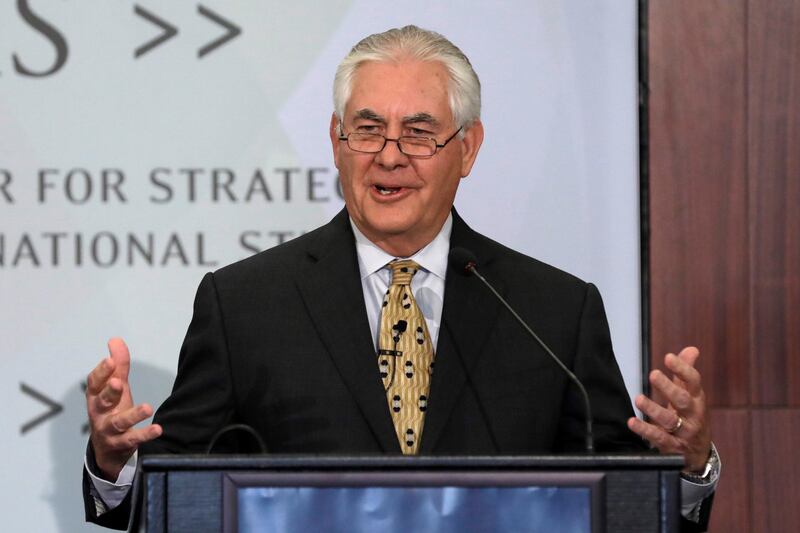The US secretary of state Rex Tillerson makes his first official visit to India on Tuesday with a mission to enlist New Delhi as a partner to counter China in the Pacific.
Mr Tillerson called for much stronger ties between the United States and India and was heavily critical of China in a speech at the Centre for Strategic and International Studies in Washington on Wednesday. He also scolded Pakistan for not doing enough on terrorism.
“The Trump administration is determined to dramatically deepen ways for the United States and India to further this relationship,” Mr Tillerson said.
He also compared China unfavourably with India.
“China, while rising alongside India, has done so less responsibly, at times undermining the international, rules-based order even as countries like India operate within a framework that protects other nations’ sovereignty,” he said.
Mr Tillerson, whose stop in South Asia is part of a week-long trip that includes Riyadh, Doha and Geneva, is expected to fly to Islamabad as well, either before or after his visit to India.
His speech on Wednesday, however, devoted almost no time to Pakistan. In the little that he said, he pointed out: “We expect Pakistan to take decisive action against terrorist groups based within their own borders that threaten their own people and the broader region.”
Mr Tillerson’s intention to focus on alliance for “security and prosperity in the Indo-Pacific” would fall under a US proposal for “quadrilateral co-operation” in the region that was first suggested in 2007. The US defence secretary James Mattis had raised the idea again during a visit to New Delhi last month, the Indian government said.
____________
Read more:
US Secretary of State to tour Saudi Arabia and Qatar
What the Tillerson-Trump tensions mean for the Middle East
____________
The notion involves roping India, the US, Australia and Japan into a four-cornered cordon for China’s economic and military presence in the Pacific.
China’s contentious claims to maritime boundaries and oil deposits in the South China Sea, and its aggressive moves to secure them, are of particular concern.
“China’s provocative actions in the South China Sea directly challenge the international law and norms that the United States and India both stand for,” Mr Tillerson said.
Mr Tillerson’s remarks put India in a delicate situation, coming as they do towards the end of a year in which New Delhi’s relationship with Beijing has been particularly fraught.
Over the summer, Indian and Chinese troops were engaged in a 73-day military stand-off in Doklam, a Himalayan valley that is contested by China and Bhutan and that borders the Indian state of Sikkim.
The stand-off was resolved until August 28 after prolonged negotiations but the region remains tense, with Chinese troops still stationed barely a dozen kilometres from Doklam and Indian troops also nearby.
There are other sources of tension between the two countries as well.
On Friday, 400 Indian troops and 1,000 Russian servicemen began joint military exercises off Russia’s eastern coast, not far from China. The exercises are the first to involve the two countries’ army, navy and air force simultaneously, and feature.
China's state-run media outlets have also criticised India for levying anti-dumping duties on 93 categories of Chinese-made products, including steel, plastic, electronics and rubber.
The duties were intended to correct a fundamental trade imbalance, said S K Mohanty, a New Delhi-based economist who specialises in India-China relations.
“When you have so many exports coming from China to India, they must be competitive compared to other suppliers in India,” Mr Mohanty said. In the reverse direction, he added, China has “not fully opened up” to Indian products.
Given these tensions, this a sensitive time for India and the US to loudly proclaim their stance against China in the Pacific, although Indian officials have previously expressed their support for the model of quadrilateral co-operation.
Both the concept and Mr Tillerson’s speech have drawn a sharp reaction from China.
On Friday, Lu Kang, a spokesman for China’s foreign ministry, asked that the US "put China’s development and China’s positive role in the world into perspective”.
“China steadfastly upholds the international order,” he said. “China will by no means pursue its own development at the expense of other countries' interests. Neither will China give up its own legitimate rights and interests.”
Beijing welcomes the new warmth between the US and India, he said, “but opposes any move that targets China”.





